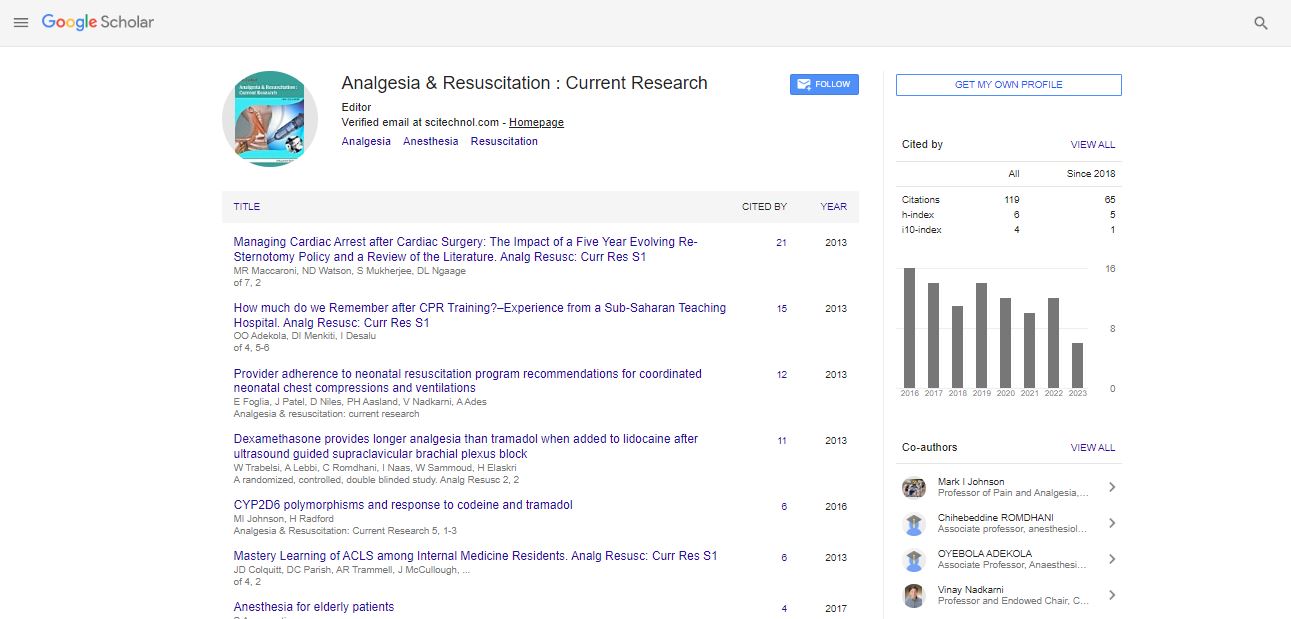The effectiveness of using extracorporeal shockwave therapy for the treatment of fibromyalgia
Ziad Elchami
IMC, KSA
: Analg Resusc: Curr Res
Abstract
Introduction: Fibromyalgiais a disorder characterized by widespread musculoskeletal pain accompanied by fatigue, sleep, memory and mood issues. Researchers believe that fibromyalgia amplifies painful sensations by affecting the way your brain processes pain signals. Objective: The objective is to discuss the effectiveness of Extracorporeal Shockwave (ESWT), by applying either 9 or 12 sessions, for the treatment of fibromyalgia. Aim: The aim is to establish the efficacy of ESWT in the management of fibromyalgia. Methods: 50 female patients were evaluated; with generalized muscle pain with tenderness, over the fibromyalgia trigger points, randomly allocated to receive either 9 or 12 sessions of ESWT (trial was conducted for a period of 4 years in Pain & Headache Center, IMC, KSA). ESWT applied to the affected trigger points and radiating triggered muscles. Inclusive criteria: Group A: age: 25-70; mean age = 48 (for patients who had 9 sessions); Group B: age: 35-80; mean age = 57 (for patients who had 12 sessions). Exclusive criteria: Pediatric patients, anyone with pacemaker and has a history of bleeding tendencies and as per the other exclusive criteria of ESWT. Results: Average improvement of 70% was appreciated in patients approaching 9 sessions of treatment (A). ESWT was applied to the trigger point and up to 80% approaching 12 sessions attained after one month and sustained up to 9 months in group A and at least 12 months in group B. Conclusions: ESWT therapy was proven to improve fibromyalgia pain, other trigger points and radiating pain patients without the need for further medication or PT treatments.
Biography
Ziad Elchami, Director of Pain & Headache Management Center at the International Medical Center (IMC), Jeddah, KSA, is a Pain & Headache Management Consultant, who specializes in chronic pain and neurology. His clinical interests include: clinical neurophysiology, neuromuscular disorders, and pain. He completed his medical degree at the University of Damascus. He then joined Kansas University Neurology Residency Program where he completed both his residency and fellowship programs in Clinical Neurophysiology and Neuromuscular Disorders. During this period, he served as Chief Residents and Chief Fellow, as well. He has a Pain & Headache Fellowship from Cleveland Clinic Foundation where he worked from 2003-2005. He deals with all cases related to chronic pain, chronic spine pain, and chronic migraine. He achieved many awards and is well-published in both major national and international journals. He also has presented more than 70 abstracts in various conferences and seminars world-wide.
 Spanish
Spanish  Chinese
Chinese  Russian
Russian  German
German  French
French  Japanese
Japanese  Portuguese
Portuguese  Hindi
Hindi 
